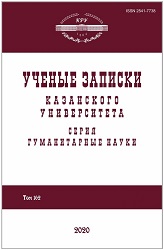Макс Вебер о России в 1905–1917 гг.: ценностные суждения или «полное понимание фактов»
Max Weber about Russia of 1905–1917: Value Judgments or “Full Understanding of the Facts”
Author(s): Natalia Vasilievna RostislavlevaSubject(s): Political Philosophy, Civil Society, Contemporary Philosophy, Government/Political systems, Pre-WW I & WW I (1900 -1919), Sociology of Politics
Published by: Казанский (Приволжский) федеральный университет
Keywords: Max Weber; Russia; reflection; First Russian Revolution; World War I; February Revolution of 1917; values;
Summary/Abstract: The perception of Russia in 1905–1917 by Max Weber, a German sociologist, politician, and philosopher, was studied. His interest in Russia arose in connection with the First Russian Revolution. In the work “To the Status of Bourgeois Democracy”, M. Weber interpreted freedom from the position of protestant values and believed that Russian liberalism would be successful only if it breaks with the tradition. During the period between the two Russian revolutions, M. Weber retained his interest in Russia. In 1909, M. Weber’s statements about the prospects for renewal in Russia were at the center of discussions on the pages of “Heidelberger Zeitung” and “Russkie Vedomosti”. During the World War I, M. Weber’s values prevailed in the judgments about Russia: he perceived it as the main threat to the culture of Germany and Europe as a whole. In the February Revolution of 1917, he saw opportunities for conservatism strengthening. Having perceived Russia through his values, M. Weber had an incomplete understanding of the Russian reality, but his long appeal to the “Russian theme” proves a sustained interest in the Russian experience.
Journal: Ученые записки Казанского университета. Серия Гуманитарные науки
- Issue Year: 162/2020
- Issue No: 3
- Page Range: 171-180
- Page Count: 10
- Language: Russian

